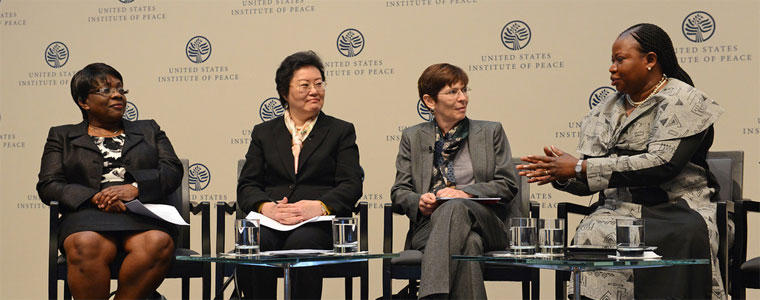Preventing and Mitigating Conflicts: Role of the International Courts
The U.S. Institute of Peace, the Georgetown Institute for Women, Peace and Security and The Hague Institute for Global Justice, hosted a dialogue with the Prosecutor from the International Criminal Court (ICC) and jurists from the International Court of Justice (ICJ) on April 11th at USIP, to discuss the role of the international courts in preventing and mitigating conflicts.

International courts are intended to prevent conflict and settle international disputes, both by holding to account those alleged to have committed international crimes and by developing applicable international law. Their role is an essential but under-examined aspect of international conflict management. This event, convened by the U.S. Institute of Peace, the Georgetown Institute for Women, Peace and Security and The Hague Institute for Global Justice, offered an opportunity for dialogue with four senior international jurists, including three judges of the International Court of Justice (Joan Donoghue, Julia Sebutinde and Xue Hanqin) and Prosecutor Fatou Bensouda of the International Criminal Court.
This event, held with the support of the Foreign Ministry of the Kingdom of the Netherlands, and the American Bar Association’s ICC Project, centered on the role of the International Court of Justice (ICJ) and the International Criminal Court (ICC) within the international political and legal system. The focus of the discussion was on the role of the courts based in The Hague (The Netherlands) in preventing and resolving conflicts, in accomplishing accountability for war crimes, and on the contribution of women to peaceful settlement of disputes and strengthening the international rule of law.
Speakers
Mr. Peter Loge, Welcoming and Introductory Remarks
U.S. Institute of Peace
Judge Joan Donoghue, Expert Panelist
International Court of Justice
Judge Xue Hanqin, Expert Panelist
International Court of Justice
Judge Julia Sebutinde, Expert Panelist
International Court of Justice
Prosecutor Fatou Bensouda, Expert Panelist
International Criminal Court
Professor Jane Stromseth, Concluding Remarks
Georgetown Law Center and U.S. Department of State
Dr. Abiodun Williams, Moderator
The Hague Institute for Global Justice



